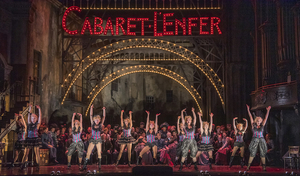Review: FAUST, Royal Opera House Online

![]() Last night was the online premiere of the Royal Opera House's Faust, broadcast for free as part of the #OurHouseToYourHouse series. This is David McVicar's production, recorded in 2019.
Last night was the online premiere of the Royal Opera House's Faust, broadcast for free as part of the #OurHouseToYourHouse series. This is David McVicar's production, recorded in 2019.
The French opera, debuting in 1859, is based on Goethe's dramatic poem of the same name and tells the cautionary tale of the aged philosopher who strikes a bargain with the Devil. Faust is bought the love of the youthful and beautiful Marguerite, but tragedy ensues. Eventually, almost all the characters fall into paths of misery and despair, including Marguerite's young suitor Siébel and brother Valentin. Faust is one of the world's most popular operas and remains a core repertory work today.
The score was written by Charles-François Gounod, with a libretto by Jules Barbier and Michel Carré. Their music is robust, full of passion and deeply moving. Those new to opera and fans alike may recognise famous numbers such as "The Jewel Song", "Salut! Demeure, Chaste et Pure", and "The Soldiers' Chorus".
Irina Lungu's Marguerite is wholesome, warm and sweet, with a clear and full soprano voice. Her performance of the famous "Jewel Song" does not disappoint and is enjoyably youthful and girlish. Stéphane Degout's "Avant de Quitter Ces Lieux" is a particular standout performance, portraying pride and passion beautifully. Erwin Schrott's voice, as the Devil himself, is unforgettable, and his deep, hearty baritone is a treat to hear.
David McVicar's direction has the grandest of Royal Opera staging. Unmistakably set in 1870s Paris, this production depicts the decadence, elegance and artistic richness of the era. There is a strong theme of Christianity in this production, juxtaposed with the consistent celebration of female beauty and sensuality. The costumes by Brigitte Reiffenstuel are accurately reflective of 19th-century French fashion, and are beautifully intricate and elaborate. As is Charles Edwards' spectacularly theatrical set design, which is themed by a rich red that could be representative of passion, sex and love, as well as Hell and blood.
The choreography by Michael Keegan-Dolan is particularly poignant, bold and creative. I loved the Moulin Rouge-reflective "Cabaret d'Enfer" scene in Act II, while Act V's macabre orgy simulation ballet is particularly memorable. McVicar's plush direction has become a much-loved part of the Royal Opera House's repertory, this time being revived by Bruno Ravella.
Despite my abundant praise of all the elements within this production, there is a niggling question about why this production is worth seeing now. The strong religious themes, objectification of women, male-dominated cast and non-relatable setting risks Faust being largely irrelevant to today's audiences.
Yet, the struggle between good and evil in oneself and a societal obsession with youth and sex is still very applicable to modern society, so perhaps a modern setting is all Faust needs. I would love to see what Emma Rice would do with a season at the Royal Opera House - perhaps post-Coronavirus!
Nevertheless, those looking to take a step back in time and revel in the magnificent history of opera will absolutely adore this sumptuous show that spares no expense.
The Royal Opera House is asking for donations to help sustain their community during the COVID-19 global crisis. You can donate to the Royal Opera House HERE.
Faust is available to watch on YouTube and Facebook until 30 July
Photo credit: Tristram Kenton
Add Your Comment
Videos


